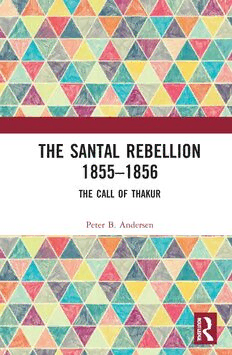
The Santal Rebellion 1855–1856: The Call of Ṭhạkur PDF
Preview The Santal Rebellion 1855–1856: The Call of Ṭhạkur
THE SANTAL REBELLION 1855–1856 The book presents a new interpretation of the Santal Rebellion, the Hul 1855–1856, drawing on the colonial sources as well as Santal memories. It offers a critique of postcolonial approaches that overlook specifically tribal perspectives and see the Hul as a class-based peasant rebellion. The author analyses the Hul and its participants – the Santals and their opponents, both the colonial administration and the Bengalis. He also looks at the attempts of the Hul’s leaders, Sido and Kạnhu, to reform the Santal religion. Offering a new, respectful reading of the Hul’s religious legitimation, the book argues that changes in Santal religion and ethics were responses to the colonial regime’s new and aggressive economic order. The Hul’s leaders, Sido and Kạnhu, demanded the introduction of just laws based on the universal principle of equality. This historical approach leads to a call for the inclusion of the voice of tribal and Ādivāsī minorities when formulating politics for their development in the 21st century. The book is relevant for researchers and students of social history, social reform, tribal and indigenous studies, postcolonial studies and South Asian studies. Peter B. Andersen is a sociologist of religion and an associate professor in the Department of Cross-Cultural and Regional Studies, University of Copenhagen, Denmark. His main areas of interest are modernity and the changes in religion in the modern period up to the present. His early work focused on the transmission of Hindu and Buddhist practices and beliefs into Santal religious practices, and on the change from oral to print transmission of knowledge among the Santals. In India, he has worked in Tranquebar, Tamil Nadu, among the Bodos in Assam, and among the Santals in several eastern Indian states. His Dr Ambedkar Memorial Lecture at NISWASS was published as Santals: Glimpses of Culture and Identity (2005). He co-authored From Fire-Rain to Rebellion: Reasserting Identity through Narratives (with M. Carrin and S.K. Soren, 2011) and edited The Bodo of Assam: Revisiting a Classical Study from 1950/ Halfdan Siiger (with S.K. Soren, 2015) and, most recently, Re-Interrogating Civil Society in South Asia: Critical Perspectives from India, Pakistan and Bangladesh (with Rubya Mehdi and Amit Prakash, 2021). Several articles, including collaborations with Kumkum and Ranjit Bhattacharya, and with Boro Baski, address literature in minority languages. In Denmark, he has helped to design and conduct a number of surveys and is a member of the European Values Study working group. In 2021, findings from his independent survey on the COVID- 19 crisis in Denmark, ‘Covid-19 – Religion and Existential Wellbeing’, were published as a thematic issue of the Danish Journal Religionsvidenskabeligt Tidsskrift. THE SANTAL REBELLION 1855–1856 The Call of Ṭhạkur Peter B. Andersen First published 2023 by Routledge 4 Park Square, Milton Park, Abingdon, Oxon OX14 4RN and by Routledge 605 Third Avenue, New York, NY 10158 Routledge is an imprint of the Taylor & Francis Group, an informa business © 2023 Peter B. Andersen The right of Peter B. Andersen to be identifed as author of this work has been asserted in accordance with sections 77 and 78 of the Copyright, Designs and Patents Act 1988. All rights reserved. No part of this book may be reprinted or reproduced or utilised in any form or by any electronic, mechanical, or other means, now known or hereafter invented, including photocopying and recording, or in any information storage or retrieval system, without permission in writing from the publishers. Trademark notice: Product or corporate names may be trademarks or registered trademarks, and are used only for identifcation and explanation without intent to infringe. British Library Cataloguing-in-Publication Data A catalogue record for this book is available from the British Library Library of Congress Cataloging-in-Publication Data A catalog record has been requested for this book ISBN: 978-1-032-27346-4 (hbk) ISBN: 978-1-032-37460-4 (pbk) ISBN: 978-1-003-34030-0 (ebk) DOI: 10.4324/b23196 Typeset in Sabon by Deanta Global Publishing Services, Chennai, India TO THE MEMORY OF DR DHIRENDRA NATH BASKEY CONTENTS List of illustrations ix Preface x Glossary xv 1 Introduction 1 2 A brief note on existing research related to the Santal rebellion 34 3 Sources of information related to the Santal rebellion and Santal religion 42 4 The Santals and the Damin-i-Koh 57 5 Changes of religious mood in the run-up to the Santal rebellion 69 6 The course of the Santal rebellion 95 7 Transformation of religion and ritual legitimation 141 8 Purity and atrocities 192 9 Aftermath and amends? 212 10 The Santal rebellion on the background of Indian religion in the 19th century 225 vii CONTENTS 11 Identities and rebellions: Tribal or peasant 238 12 Logics, ethics and existence 246 13 Summary and conclusions 259 Appendix I: Place names 275 Appendix II: Bengal Judicial Proceedings 278 References 289 Index 304 viii ILLUSTRATIONS Figures 4.1 The Rajmahal Hills 58 4.2 Revenue received on account of Damun lands 62 5.1 ‘Sonthal Dance by Moonlight’ 72 5.2 ‘Sonthal Trophy’ 87 6.1 Sido 96 6.2 March from Nagore 119 6.3 ‘The 45th Regiment Burning down a Santhal Village and Recovering Plunder’ 125 6.4 ‘Santal prisoners and an informer’ 132 6.5 ‘Santal prisoners being led away’ 133 8.1 Map of Major Shuckburgh’s Santal village-burning tour 193 8.2 ‘The Savage and the Maiden’ 201 9.1 ‘Searching for the Santals’ 221 Map 1.1 The Area, 1855 1 ix
